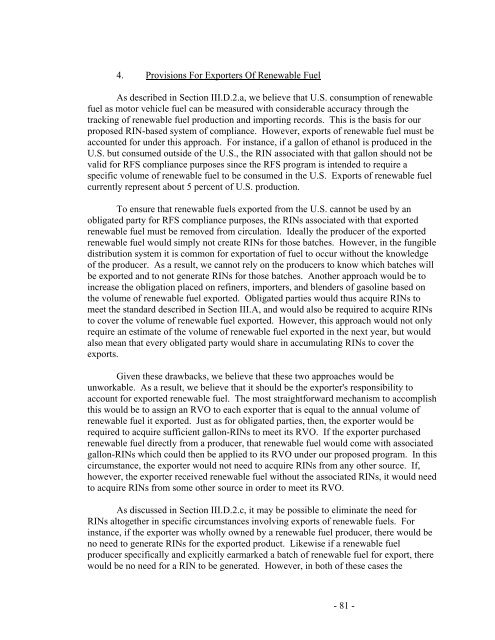Regulation of Fuels and Fuel Additives: Renewable Fuel Standard ...
Regulation of Fuels and Fuel Additives: Renewable Fuel Standard ...
Regulation of Fuels and Fuel Additives: Renewable Fuel Standard ...
You also want an ePaper? Increase the reach of your titles
YUMPU automatically turns print PDFs into web optimized ePapers that Google loves.
4. Provisions For Exporters Of <strong>Renewable</strong> <strong>Fuel</strong><br />
As described in Section III.D.2.a, we believe that U.S. consumption <strong>of</strong> renewable<br />
fuel as motor vehicle fuel can be measured with considerable accuracy through the<br />
tracking <strong>of</strong> renewable fuel production <strong>and</strong> importing records. This is the basis for our<br />
proposed RIN-based system <strong>of</strong> compliance. However, exports <strong>of</strong> renewable fuel must be<br />
accounted for under this approach. For instance, if a gallon <strong>of</strong> ethanol is produced in the<br />
U.S. but consumed outside <strong>of</strong> the U.S., the RIN associated with that gallon should not be<br />
valid for RFS compliance purposes since the RFS program is intended to require a<br />
specific volume <strong>of</strong> renewable fuel to be consumed in the U.S. Exports <strong>of</strong> renewable fuel<br />
currently represent about 5 percent <strong>of</strong> U.S. production.<br />
To ensure that renewable fuels exported from the U.S. cannot be used by an<br />
obligated party for RFS compliance purposes, the RINs associated with that exported<br />
renewable fuel must be removed from circulation. Ideally the producer <strong>of</strong> the exported<br />
renewable fuel would simply not create RINs for those batches. However, in the fungible<br />
distribution system it is common for exportation <strong>of</strong> fuel to occur without the knowledge<br />
<strong>of</strong> the producer. As a result, we cannot rely on the producers to know which batches will<br />
be exported <strong>and</strong> to not generate RINs for those batches. Another approach would be to<br />
increase the obligation placed on refiners, importers, <strong>and</strong> blenders <strong>of</strong> gasoline based on<br />
the volume <strong>of</strong> renewable fuel exported. Obligated parties would thus acquire RINs to<br />
meet the st<strong>and</strong>ard described in Section III.A, <strong>and</strong> would also be required to acquire RINs<br />
to cover the volume <strong>of</strong> renewable fuel exported. However, this approach would not only<br />
require an estimate <strong>of</strong> the volume <strong>of</strong> renewable fuel exported in the next year, but would<br />
also mean that every obligated party would share in accumulating RINs to cover the<br />
exports.<br />
Given these drawbacks, we believe that these two approaches would be<br />
unworkable. As a result, we believe that it should be the exporter's responsibility to<br />
account for exported renewable fuel. The most straightforward mechanism to accomplish<br />
this would be to assign an RVO to each exporter that is equal to the annual volume <strong>of</strong><br />
renewable fuel it exported. Just as for obligated parties, then, the exporter would be<br />
required to acquire sufficient gallon-RINs to meet its RVO. If the exporter purchased<br />
renewable fuel directly from a producer, that renewable fuel would come with associated<br />
gallon-RINs which could then be applied to its RVO under our proposed program. In this<br />
circumstance, the exporter would not need to acquire RINs from any other source. If,<br />
however, the exporter received renewable fuel without the associated RINs, it would need<br />
to acquire RINs from some other source in order to meet its RVO.<br />
As discussed in Section III.D.2.c, it may be possible to eliminate the need for<br />
RINs altogether in specific circumstances involving exports <strong>of</strong> renewable fuels. For<br />
instance, if the exporter was wholly owned by a renewable fuel producer, there would be<br />
no need to generate RINs for the exported product. Likewise if a renewable fuel<br />
producer specifically <strong>and</strong> explicitly earmarked a batch <strong>of</strong> renewable fuel for export, there<br />
would be no need for a RIN to be generated. However, in both <strong>of</strong> these cases the<br />
- 81 -
















